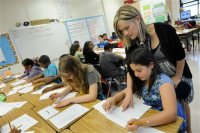Two weeks ago, my little brother stayed home from school during Yom Kippur. The next day, he stayed home during Eid. This is because last March, the de Blasio administration announced that it will add Eid as a holiday to the New York City public school calendar. I was very happy to hear this news and feel that all public schools should close during this important holiday. This move by the administration not only meant that my little brother would get to attend Eid prayer in the morning with my dad and participate in Eid festivities, like visiting relatives and collecting Eid money, without missing a day of school, it also meant that NYC public school students would get a chance to learn about and celebrate a growing community that has been misunderstood and mistreated since 9/11. This is also a learning moment for adults.
Having come to America two years post 9/11, I have personally faced discrimination from peers who had no idea what 9/11 was and how it happened, but accused all Muslims of part taking in it. I think ignorance that was passed to them by their parents, relatives and other adults played a major role in this dynamic. Muslims were not the only ones that were affected by 9/11. Sikh communities also felt the impact.
One of the most talked-about incidents was a shooting in a Wisconsin gurdwara, Sikh house of worship, in August of 2012. In 2013, the Boston Marathon bombing took place. The immediate reaction of the crowd after the explosion was to jump a Saudi man who happened to be a spectator at the marathon. Soon after, Palestinian doctor Heba Abolaban, who lives in the Malden area of Massachusetts, was punched in the face by an angry man. As he walked away, he called out religious stereotypes against all Muslims. Earlier this year, an Indian grandfather was left paralyzed by a police officer who received a call about a “suspicious man in the neighborhood.” And just last month, 14-year-old Ahmed Mohamed was arrested for building a clock that school authorities mistook for a bomb. I can keep going, but I will not. Again and again, the Muslim community faces widespread discrimination for something one fundamentalist group did 14 years ago. We are currently living in an Islamophobic America and this discrimination has to come to an end. I personally think it must start in the classroom because the media is not helping.
Shows like “Quantico,” which follows the lives of young FBI trainees, one of which is the half-Indian main character who is suspected of plotting a terrorist attack, do nothing to break the stereotype that Muslims are terrorists. Similarly, “Aliens in America,” which aired from 2007 to 2008 and followed a Pakistani exchange student living with an American family in Wisconsin, simply showed that people of the Islamic faith with brown skin tone cannot be normal Americans and blend into the American culture.
Currently, several schools districts in Vermont, Massachusetts, and New Jersey close their public schools in observance of the Muslim holidays. New York’s move to embrace the diversity of public school students, 10 percent of whom are Muslim, a 2009 study revealed, should encourage other school districts to celebrate the diversity of their students. Students should not have to choose between their faith tradition and school. Some parents and school administrators are concerned that if they add Eid to the public school calendar, their children will miss two days of school. The de Blasio administration addressed this issue by turning two half-days into full school days. This is something they should consider.
Having attended public school for eight years in America, I was aware of other faith traditions. I knew what Hanukkah, Kwanzaa, Christmas and Easter were. I knew what the “Ash Wednesday” designation on my calendar meant. The lines to “Kwanzaa Child” are still ingrained in my memory from middle school choir. I still know how to play “Jolly Old Saint Nicholas” on a clarinet. My point is, we should not prioritize one faith over another when they all share values that promote human goodness. Plus, if children get a holistic understanding of different faith traditions, they will become more worldly and less ignorant of the diverse world around them. Is that not what school is supposed to teach?
Halima Begum, FCRH ’16, is a humanitarian studies and urban studies double major from Sylhet, Bangladesh.





